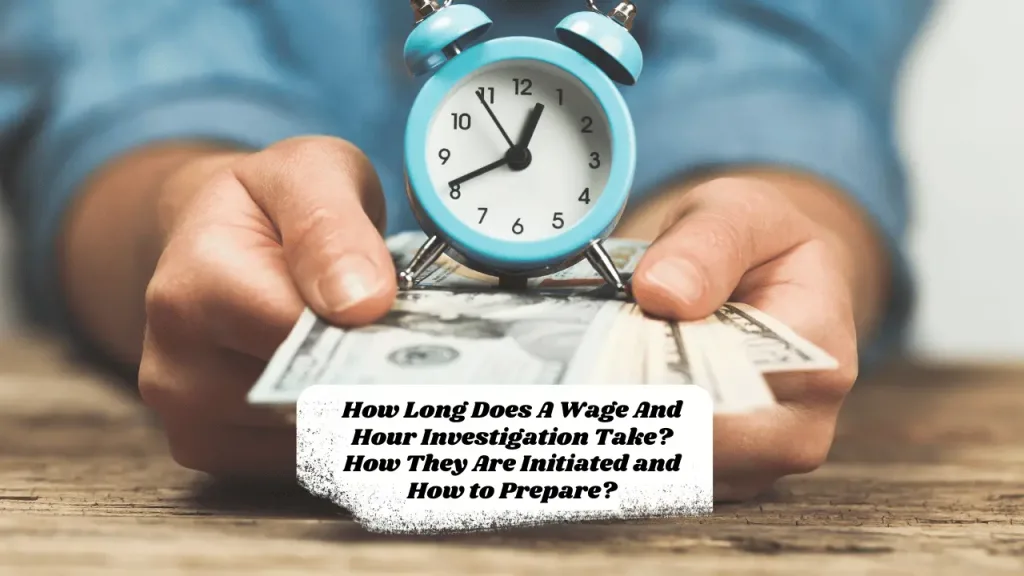How Long Does A Wage And Hour Investigation Take? How They Are Initiated and How to Prepare?
Wage and hour investigations are essential for ensuring compliance with labor laws, such as the Fair Labor Standards Act (FLSA) in the United States. These investigations can be stressful for employers but understanding how they begin and preparing adequately can make the process smoother. Below is a detailed overview of how wage and hour investigations are initiated and steps to prepare effectively.
Table of Contents
How Wage and Hour Investigations Are Initiated
- Employee Complaints
- The most common trigger for an investigation is a complaint filed by an employee or a former employee. Complaints can involve allegations of unpaid wages, improper overtime calculations, or misclassification of workers.
- Complaints are typically confidential, and investigators will not disclose the complainant’s identity to the employer.
- Random Audits
- The Wage and Hour Division (WHD) of the U.S. Department of Labor (DOL) may conduct random audits to ensure businesses comply with federal labor laws. These audits are often industry-focused, targeting sectors known for wage violations, such as construction, hospitality, and healthcare.
- Targeted Enforcement Initiatives
- The DOL and state agencies may initiate investigations in specific industries or geographic areas with a high prevalence of wage violations. This proactive approach aims to address systemic issues.
- Referrals from Other Agencies
- Referrals from other government agencies, such as the Equal Employment Opportunity Commission (EEOC) or state labor departments, can also prompt an investigation. For instance, a tax audit might uncover payroll discrepancies, triggering a wage and hour inquiry.
- Media Reports or Public Information
- Negative media coverage, whistleblower reports, or public complaints can alert authorities to potential violations, prompting an investigation.
- Follow-Up Investigations
- Employers with a history of violations may be subject to follow-up investigations to ensure ongoing compliance.
Related article for you:
How Many Hours Did The Federal Wage And Hour Law of 1941 Acts Set The Work Week To?

How to Prepare for a Wage and Hour Investigation
- Maintain Accurate Records
- Timekeeping: Ensure that time records are accurate and up-to-date for all employees, including breaks, overtime, and hours worked.
- Payroll Documentation: Keep detailed payroll records showing wage calculations, deductions, and payment schedules.
- Employee Classifications: Regularly review employee classifications (exempt vs. non-exempt) to ensure compliance with labor laws.
- Conduct Internal Audits
- Perform periodic self-audits to identify and correct potential compliance issues. This includes reviewing pay rates, overtime policies, and employee classifications.
- Address discrepancies immediately to reduce the risk of penalties.
- Train Managers and Supervisors
- Provide training to managers and supervisors on wage and hour laws, particularly regarding overtime, meal breaks, and employee classification.
- Educate them about proper recordkeeping practices and the importance of compliance.
- Respond Promptly to Document Requests
- Investigators typically request specific records, such as timesheets, payroll logs, and employment agreements. Organize these documents in advance to avoid delays.
- Ensure that all documents are accurate and complete before submission.
- Designate a Point of Contact
- Assign a knowledgeable employee or legal representative to communicate with investigators. This helps ensure consistency and clarity in responses.
- Consult Legal Counsel
- Engage an employment lawyer with experience in wage and hour laws. Legal counsel can help you understand the investigation process and address potential issues.
- Cooperate Fully with Investigators
- During interviews and site visits, provide requested information and answer questions honestly. Avoid obstructing the investigation, as this can lead to additional scrutiny or penalties.
- Develop a Contingency Plan
- Prepare for potential outcomes, including back pay calculations, penalties, or changes to policies. Establish a plan to address violations promptly and implement corrective actions.
Common Mistakes to Avoid
- Ignoring Employee Complaints
- Dismissing or failing to address employee grievances can lead to formal complaints and investigations.
- Incomplete Records
- Gaps or inconsistencies in records can raise red flags during an investigation. Maintain meticulous records to avoid this issue.
- Improper Employee Classification
- Misclassifying employees as independent contractors or exempt workers is a common violation. Regularly review classifications to ensure accuracy.
- Non-Cooperation
- Refusing to cooperate with investigators or providing incomplete information can prolong the investigation and result in harsher penalties.
Conclusion
Wage and hour investigations are a critical part of enforcing labor laws, protecting workers, and promoting fair treatment in the workplace. Understanding how these investigations are initiated and taking proactive steps to prepare can help businesses conduct the process successfully. By maintaining accurate records, conducting regular audits, and fostering a culture of compliance, employers can minimize the risk of violations and build trust with their workforce.
About the Author

Sarah Klein, JD, is a former employment attorney who has advised clients on wrongful termination, workplace discrimination, wage disputes, and employee rights. At All About Lawyer, she writes practical, legally sound guides to help workers understand labor laws and stand up for fair treatment at work.
Read more about Sarah
